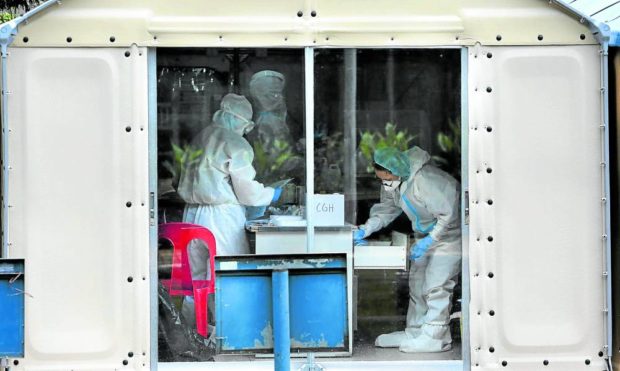
CLOSELY MONITORED: Sanctions await health facilities that are found operating without a proper disposal system for used syringes, test kits, vaccine vials, and other medical wastes. (Photo by MARIANNE BERMUDEZ / Philippine Daily Inquirer)
MANILA, Philippines — The Department of Health (DOH) on Wednesday called on healthcare facilities and local government units (LGUs) to properly dispose of medical waste, including personal protective equipment (PPE) and used syringes, and warned of sanctions on violators of disposal protocols.
“We are not going to tolerate this kind of irresponsible behavior because it can cause harm to other citizens,” Health Undersecretary Maria Rosario Vergeire said in an online media forum. She made the remarks following a report that seven children in Virac, Catanduanes, had gotten infected with COVID-19 after apparently playing with medical waste illegally dumped by a medical diagnostic center in the province.
“We would like to remind our facilities, laboratories, hospitals and [LGUs]: We have a law that covers these kinds of violations. We also have policies to guide you on what you’re supposed to do with these wastes,” she said.
Vergeire said that while used syringes from vaccination sites would not in themselves cause COVID-19 infections, their improper disposal could cause the spread of other diseases.
Waste in metric tons
In a recent report, the World Health Organization (WHO) said discarded syringes, used test kits, and old COVID-19 vaccine bottles had added up to tens of thousands of metric tons of medical waste, threatening human health and the environment.
The WHO called for reform and investment in the reduction of plastic packaging and in the manufacture of protective gear from reusable and recyclable materials.
Vergeire said the DOH had constantly been in touch with the Department of Environment and Natural Resources (DENR) and LGUs on the proper disposal of medical waste.
“We have anticipated that we will be having so much healthcare wastes, especially during the pandemic. These include the huge number of PPE that we dispose of every day [and] the syringes that we use for our vaccination program,” she said.
Manage, not reduce
A medical facility will not be licensed to operate if it does not have a proper waste disposal system, Vergeire said.
“The DOH checks their capability to process their medical wastes. We’re closely monitoring that along with the DENR,” she said.
At the same forum, Dr. Edsel Salvana ruled out the possibility of reducing the use of PPE by healthcare workers just to ease the accumulation of medical waste.
Salvana, a member of the DOH’s Technical Advisory Group, cited standards or guidelines followed by healthcare workers on the proper use of PPE.
He said the minimum use of PPE was suggested, “but if the health-care workers feel that they are not safe or they want added protection, I think they should have the freedom [of] that discretion because it’s their lives on the line.”
“Of course, waste is an issue, but … we should leave it to the better judgment of our health-care workers because we want them to feel safe,” he said.
Vergeire agreed, saying “the key … is not to reduce the protection of our health-care workers but for us to really manage the disposal of wastes.”
She said discussions on the issue were ongoing with other government agencies.
Vergeire also said there was more frequent use of PPE, especially in hospitals.
“In vaccination sites, [they’re] also required to wear PPE because there is evidence that [the virus can be transmitted] when you touch others or when you touch surfaces and then … your face. Health-care workers would also like to protect themselves,” she said. Infectious waste
The DOH also reminded the public to properly dispose of used self-administered antigen test kits. Per the guidelines it issued:
• All waste generated from the use of self-administered antigen test kits, such as swab, kit, gloves, and body fluids, are considered infectious waste that must be separated from other wastes and handled and collected in a dedicated area or space.
• All infectious waste must be put in sealed bags or containers that are leak- and moisture-resistant and durable enough to prevent tearing in normal handling conditions and/or transportation.
• All such bags or containers shall be labeled “CAUTION: INFECTIOUS WASTES.”
• In case of spills, immediate decontamination using an appropriate disinfectant is required.
The Ecological Solid Waste Management Act of 2000 or Republic Act No. 9003 requires LGUs to implement waste reduction, recycling, and composting plans.
The plans should identify disposal sites and waste management facilities in the locality or other areas and specify strategies for effective disposal. The law bans open dumpsites and requires sanitary landfills as the final disposal site for solid and residual waste.
Each local government is mandated to submit a 10-year solid waste management plan.
Under RA 9003, the National Solid Waste Management Commission was established to oversee plan implementation, prepare the national framework, and also approve local plans.
According to the DENR’s Environmental Management Bureau, a total of 1,171 solid waste management plans have been approved as of Dec. 7, 2021, and are now being implemented.
—WITH A REPORT FROM INQUIRER RESEARCH
Sources: Inquirer Archives, ADB, officialgazette.gov.ph, DOH, DENR
READ: Huge volumes of COVID medical waste threaten health – WHO